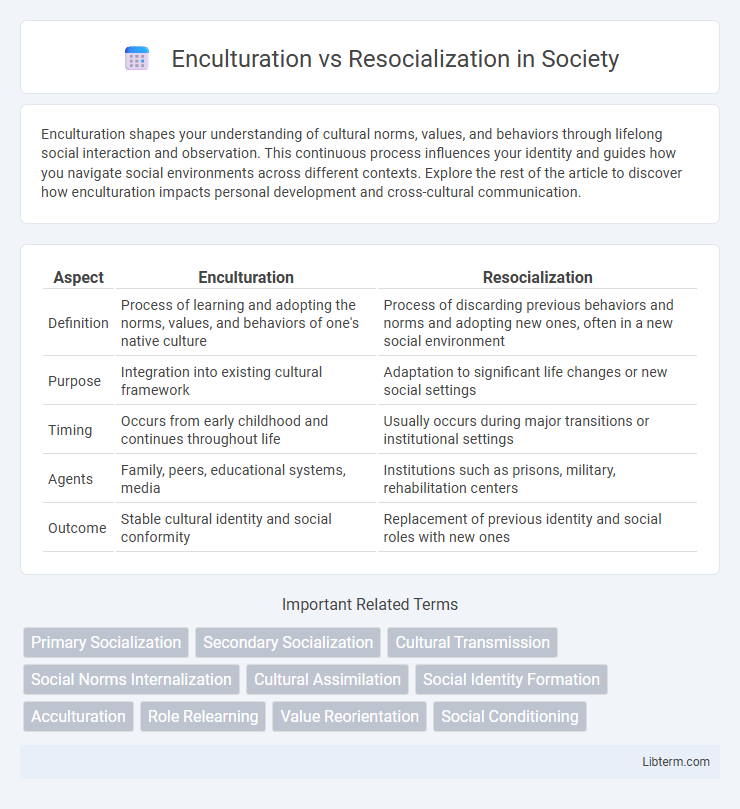Enculturation shapes your understanding of cultural norms, values, and behaviors through lifelong social interaction and observation. This continuous process influences your identity and guides how you navigate social environments across different contexts. Explore the rest of the article to discover how enculturation impacts personal development and cross-cultural communication.
Table of Comparison
| Aspect | Enculturation | Resocialization |
|---|---|---|
| Definition | Process of learning and adopting the norms, values, and behaviors of one's native culture | Process of discarding previous behaviors and norms and adopting new ones, often in a new social environment |
| Purpose | Integration into existing cultural framework | Adaptation to significant life changes or new social settings |
| Timing | Occurs from early childhood and continues throughout life | Usually occurs during major transitions or institutional settings |
| Agents | Family, peers, educational systems, media | Institutions such as prisons, military, rehabilitation centers |
| Outcome | Stable cultural identity and social conformity | Replacement of previous identity and social roles with new ones |
Understanding Enculturation: Definition and Significance
Enculturation is the process through which individuals learn and internalize the values, beliefs, norms, and customs of their native culture from an early age, shaping their identity and social behavior. It plays a critical role in cultural continuity, enabling the transmission of language, traditions, and social practices across generations. Understanding enculturation highlights its significance in fostering a sense of belonging and guiding individuals' interactions within their cultural environment.
What Is Resocialization? Key Concepts
Resocialization is the process through which individuals undergo significant behavioral and value adjustments to adapt to new social environments, often involving unlearning previous norms and adopting new roles. Key concepts include total institutions, where resocialization commonly occurs by isolating individuals from prior contexts, and the two-step process of breaking down old identities followed by building new ones. This transformation plays a critical role in settings like prisons, military boot camps, and rehabilitation centers, facilitating profound social and personal change.
Core Differences Between Enculturation and Resocialization
Enculturation involves the gradual acquisition of cultural norms and values within one's original social environment, primarily occurring during childhood and shaping identity organically over time. Resocialization entails a deliberate process of discarding previous behaviors and adopting new norms, often triggered by a significant life transition or change in social context, such as joining the military or entering a rehabilitation program. Core differences include the voluntary versus involuntary nature of adaptation and the scope of transformation, with enculturation focusing on lifelong cultural integration and resocialization targeting specific behavioral recalibration.
Agents of Enculturation in Society
Agents of enculturation in society include family, peers, educational institutions, and mass media, each playing a crucial role in transmitting cultural norms, values, and beliefs to individuals. Family serves as the primary agent, instilling foundational language skills and social behaviors from infancy, while schools reinforce societal rules and cultural knowledge through formal curricula. Peer groups and media further shape cultural identity and socialization by influencing attitudes, interests, and worldviews within diverse social contexts.
Resocialization Processes in Various Contexts
Resocialization involves a profound transformation of an individual's values, beliefs, and behaviors through intensive social processes within total institutions such as prisons, military boot camps, or rehabilitation centers. This process requires the unlearning of previous social roles and the systematic adoption of new norms dictated by the institution's structure and authority, often facilitated by strict routines, peer pressure, and authoritative control. The effectiveness of resocialization depends on factors such as the institution's coercive environment, the degree of support for new identities, and the individual's willingness to adapt to drastically altered social realities.
Cultural Transmission: How Enculturation Shapes Identity
Enculturation is the process through which individuals learn and internalize the norms, values, language, and customs of their native culture, forming the foundation of personal and social identity. This cultural transmission begins early in life, primarily through family, education, and community interactions, embedding deep-rooted beliefs and behavioral patterns. In contrast, resocialization involves adopting new cultural norms and values, often in response to major life changes or immersion in different social environments, reshaping identity beyond initial enculturation.
Examples of Resocialization in Everyday Life
Resocialization occurs when individuals undergo significant changes in norms, values, and behaviors, such as adapting to military training, entering a rehabilitation center, or joining a religious sect. These experiences require unlearning previous social norms and adopting new roles, contrasting with enculturation, which is the gradual internalization of cultural norms from childhood. Examples like transitioning into prison life, starting a new job with a distinct organizational culture, or moving to a foreign country highlight the transformative nature of resocialization.
Impact of Enculturation on Social Norms
Enculturation shapes social norms by ingraining cultural values and practices from early childhood, ensuring individuals internalize the shared beliefs and behaviors of their society. This lifelong process influences identity formation and promotes social cohesion by establishing a common framework for acceptable conduct. The impact of enculturation on social norms is evident in the widespread conformity to cultural rituals, language use, and moral codes within a community.
Challenges and Outcomes of Resocialization
Resocialization involves the process of discarding former behaviors and adopting new norms, often presenting challenges such as identity confusion, emotional stress, and resistance to change. Effective resocialization outcomes include successful adaptation to new social roles, improved social integration, and the development of behaviors aligned with new cultural or organizational expectations. The intensity of resocialization experiences varies based on individual resilience and the supportiveness of the social environment.
Enculturation vs Resocialization: Societal Implications
Enculturation shapes individuals by immersing them in their native culture's norms, values, and beliefs from birth, ensuring societal stability and continuity across generations. Resocialization occurs when individuals undergo significant cultural or social changes, often in institutions like the military or prisons, challenging existing identities to adapt to new societal roles. The societal implications involve maintaining social cohesion through enculturation while enabling social flexibility and integration through resocialization in rapidly changing environments.
Enculturation Infographic

 libterm.com
libterm.com